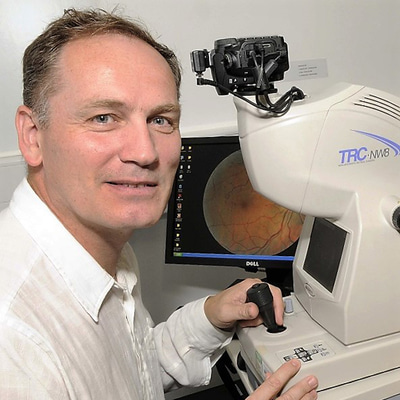Roma Malik
Locum optometrist and chair of Nottinghamshire LOC. LOCSU non-executive director (clinical), national LOC forum chair, LOCSU board liaison North East and Yorkshire, and South East LOC regional forums.

Roma Malik
Networking for me involves building relationships with fellow optometrists and optical colleagues, optometry practices, and related healthcare professionals. I’ve formed these networks through attending conferences, joining online forums/pages, and getting involved with my Local Optical Committee (LOC).
As a locum optometrist, involvement with your LOC is important to allow you to help shape, develop, and improve primary eye care services, and promotes networking opportunities within the LOC. This involvement ensures that you’re aware of all the factors impacting practices in the area, including any change to local referral guidelines, and it gives you knowledge and insight into different ways of working.
Meeting and learning from others as a locum optometrist means gaining valuable insights into different practice styles, learning about the latest advancements in optometry, and exchanging knowledge and experiences with colleagues.
I first became involved with Local Optical Committee Support Unit (LOCSU) to access resources and support for locum optometrists. This experience has given me insights into how to collaborate effectively with local professionals and participate in shaping and enhancing primary eye care services.
As a locum, you often work across a diverse range of practices with different colleagues. Having a support network within my LOC has proven to be invaluable. It provides me with a platform to discuss ideas, seek advice, and receive guidance. This collaborative environment allows for professional development and help me adapt to the ever-evolving field of optometry.
Professional connections have taught me the importance of referrals, mentorship, and staying updated with industry trends. They’ve also shown me the benefits of a support network for challenging cases and practice management.
Sam Phillips
Locum optometrist
Networking as a locum can be tricky, especially if working in small or single testing room practices. Personally, I have developed my network in various ways, from getting to know colleagues in various practices I locum in, attending in-person CPD, and using networking social media platforms like LinkedIn.
Professional connections are invaluable. They give you a really easy outlet to discuss a range of topics. An obvious example would be approaches to clinical scenarios, through to business minded things, like where your next locum opportunity may come from.
It means you can face challenges knowing you have a group of people that can offer different perspectives and insights, giving you an opportunity to develop as a practitioner and achieve the best outcomes for patients.
Getting involved in CPD set up by groups like Local Optical Committees (LOCs) or local eye hospitals is a great way to meet optometrists and dispensing opticians. These groups offer a good opportunity to socialise with peers and create contacts that can be mutually beneficial to your career as well as theirs.
Getting out and seeing how different practitioners work and meeting people is very enriching
Dr Frank Eperjesi
Locum optometrist, volunteer at Vision Care for Homeless People (VCHP) in Birmingham

Dr Frank Eperjesi
I’ve been a qualified optometrist for 32 years now, which has given me plenty of time to meet a lot of people. When I started out, I completed my pre-reg in a hospital unit and worked there for five years, then started to locum in practices in the city. That is when I started to network, meeting other optometrists outside of the hospital unit. We started to socialise together, and it also led to work opportunities.
I’m still friends with the optometrists I met when I first decided to step out of the hospital. We socialise and play football. If I hear of a practice that needs cover, I can recommend people from my network, and it works both ways.
Conferences also provided opportunities for networking. I used to attend a lot of conferences including with the American Academy of Optometry. When you are abroad, if there are few other Brits around, you tend to stick together. I’ve met a few people there.
I joined the LOC in Birmingham to see if I could help with decision-making and, after a couple of years, I became the lead of the Birmingham LOC. I met lots of different optometrists on the committee, and through the CPD events that we would organise.
My networking has been a combination of deciding to branch out and experience other elements of optometry and getting out of my comfort zone to do different things.
That is where my involvement in Vision Care for Homeless People began. I wanted to do something to help people who are homeless in Birmingham, and one of the ways I could do this was to use my optometry skills.
It was through an article I read in OT about VCHP that I decided to give it a try. Before I knew it, I was observing in a clinic in Birmingham, and shortly after I was an optometrist in the clinic and have been for around nine months now.
At VCHP I work closely with a dispensing optician called Claire Wier who is extremely knowledgeable, and I am learning a lot from her. The people I am examining are very disadvantaged. During the clinic, we have time to listen to people’s stories. Through the support of Stepper and Specsavers, we are able to provide them with high-quality, nice-looking, and functional glasses. It gives me a boost. When we finish the clinic, Claire and I give each other a high-five.
At the forefront of everything is the patients. As a locum optometrist, I am helping every patient that I see with their eye care and vision. By providing the optimum prescription, I can help someone to see better when they drive. For those who don’t need glasses, but might have a family history of eye problems, I can provide reassurance that their eyes are healthy, and people are grateful for that.
I enjoy the social engagement with the practice staff, in lunch breaks or those times between patients. I am also helping business owners to ensure their practices are prosperous and sustainable. Salaries need to be paid, as do lighting bills and the lease on the practice.
Ideas for networking and connecting with others from optometrist and OT clinical multimedia editor, Ceri Smith-Jaynes
Unless you really work at forming workplace relationships, locums can be at risk of professional isolation. Optometry changes at a pace and having a good connection to others in the profession can prevent you feeling left behind. Here are some ideas for networking:
- Join your LOC. You’ll meet the local optometry enthusiasts and you’ll be able to shape what happens in your area
- Attend CPD events in person. There may be a local society, or a regular session run by the hospital. Grab a plate from the buffet, go and sit with people you don’t know, and ask them a question
- Form a WhatsApp group. I’m in a group of local independent prescribers who share cases and meet for peer review
- Organise a registrant-led peer review. You could knock on the door of the local practices and ask if anyone wants to join. You need at least four peers. Find guidance on this on the AOP website
- Follow key opinion leaders and join specialised groups on LinkedIn. Discussions tend to be more professional than other social media networks
- AOP mentoring programme. Locum optometrists can sign up for free, impartial support, from our more experienced optometrist members – or become a mentor yourself and help someone else. Find out more online.
Credit: Source link
